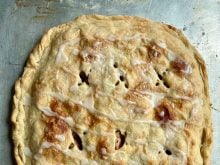Q: Lately our four year old will say things like, “I’m stupid,” or “I can’t do anything right” when she gets frustrated. It’s shocking to hear her say this because we don’t say things like that. In fact, stupid is one of the words we forbid the kids to say. We offer encouragement all the time when the kids are trying new things. We’re stumped as to how to handle it when we hear her talk like this.
A: Young children pick up information from everywhere. You can’t control what she hears elsewhere, but you can be positive in your response to her.
Read Also

Support needed at all levels for high-value solar projects
Farmers, rural municipalities and governments should welcome any opportunity to get involved in large-scale solar power installations, say agrivoltaics proponents.
Talk to her about the little frustrations you run into with her. Share not only some of your childhood frustrations but also ones you run into every day. It is important that a young child learns that the world isn’t perfect and frustrations are normal in life. If you have some funny stories about making mistakes as a child, share them with her. When we laugh at our mistakes, they don’t seem so big.
One important warning: do not respond by arguing with her when she says she’s stupid. She won’t believe you. You will only reinforce her own negative views of herself. Instead, accept that her feeling is real to her at that moment. Once you accept how she feels, she will be more likely to really listen to you.
Tell her you are glad she is talking about her feelings and this will give you the opening to explore the actual situations with her. Teach her not to base her self-esteem on what others say to her or expect from her.
When we don’t do something right, we usually have forgotten how to do it and we must learn it again. If both you and she can laugh about how we sometimes forget things, then she won’t take it so personally when it happens to her.
Also, make up or find little learning games appropriate to her age and her personal development. Most of us played Snakes and Ladders as children. Get a large piece of paper, mark it into 100 squares and make up your own game for her based on her own experiences. The advantage of such a game that uses the random numbers of dice is that we experience not being able to control what happens around us in a safe and friendly way.
Story telling can teach children to think positively about themselves. Check with your local library for storybooks. Or make up your own stories involving fictitious animals or people, and how they have a choice whether they feel good or bad about what happens around them.
An excellent book, now out of print and difficult to find, is Vultures by Sidney Simon. If you do a search on the Saskatchewan Libraries website, you will find some columns I wrote years ago, sharing his basic ideas.
Pat Palmer also wrote a book,
Liking Myself, geared for pre-school children. It deals with having good feelings. Another book is The Mouse, The Monster and Me to teach children to assert themselves. The books are not in print but may be in libraries and second hand copies are available from Amazon.ca.
Children are not little adults but adults sometimes forget this.
Giving genuine compliments is important. They can also be given indirectly. When you see her doing something, just remark on that
to your partner or other family members.
Kids have big ears, and they often learn better when they hear other people talking about them, rather than being talked to directly.
Peter Griffiths is a mental health counsellor based in Prince Albert, Sask. His columns are intended as general advice only. His website is www.sasktelwebsite.net/petecope.














